Younis rarely stands in the street any more. The 29-year-old, from Daraa, Syria, has been hiding in London for nearly two years and the fear of being caught is written on his face.
Having a cigarette on the pavement of a busy London street before an interview with BuzzFeed News, he cowers in the doorway as a police car drives past. He is convinced that one day soon it will be a moment like this that brings his life in Britain to an abrupt end.
Younis is one of a growing number of Syrians experts say are hiding in the UK because they were forced to give their fingerprints in another European country on their journey to Britain – and fear being returned there.
An agreement called the Dublin Regulation means refugees can be returned to the first European state they arrived in. In practice, this means the first place they gave their fingerprints, as this is irrefutable evidence of an earlier arrival elsewhere in Europe.
This agreement is causing more refugees than ever to go underground in Britain, according to the charity Migrant Voice. Many are desperate to stay because they have close family in the UK and have already started to build a new life.
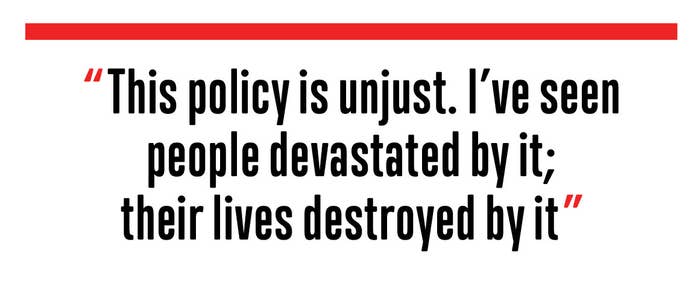
Once asylum-seekers are told they have no leave to remain in Britain, they are made to sign at Home Office reporting centres, to prove they have not disappeared off the radar. But the charity says many Syrians in particular are choosing to avoid this altogether in the hope they can prevent being sent away.
Nazek Ramadan, the charity’s director, told BuzzFeed News: “This policy is creating more underground migrants. I’m seeing more people who go underground and stop signing. People are so desperate to stay they’ll kill themselves rather than go back to these countries.
“This policy is unjust. I’ve seen people devastated by it; their lives destroyed by it. I have been shocked by the number of Syrians affected by it. Most of them have family here: mothers, fathers, sisters, brothers. They can’t understand why the government can’t see the importance of them being with their family.”
Though the government does make some exceptions for families to keep them together, that only applies if they are direct dependents, such as young children or a spouse.
In a report published on Wednesday, Migrant Voice details the experiences of refugees living in Britain, mostly Syrians, who live in fear of being returned to European countries where they were often very seriously mistreated.
Ramadan added: “It’s inhumane and cruel. These are human beings, they’re not coming for a holiday. They’ve been out of their country for years and what they need is their families. This policy is not working at all. The purpose of this policy is to protect northern European countries and keep refugees in southern Europe, where countries are already struggling financially.”
The regulations do not force member states to send asylum-seekers away. In Germany, for example, Syrians are accepted as refugees regardless of the European country they are first fingerprinted in. Migrant Voice is calling on the British government to amend its policy and show compassion to the refugees already here.
Southern European countries with struggling economies are now routinely inundated with refugees and asylum-seekers who have no desire to be there. In 2015 the UK made 3,500 requests to return asylum-seekers to countries across Europe, including Bulgaria, Italy, and Hungary.
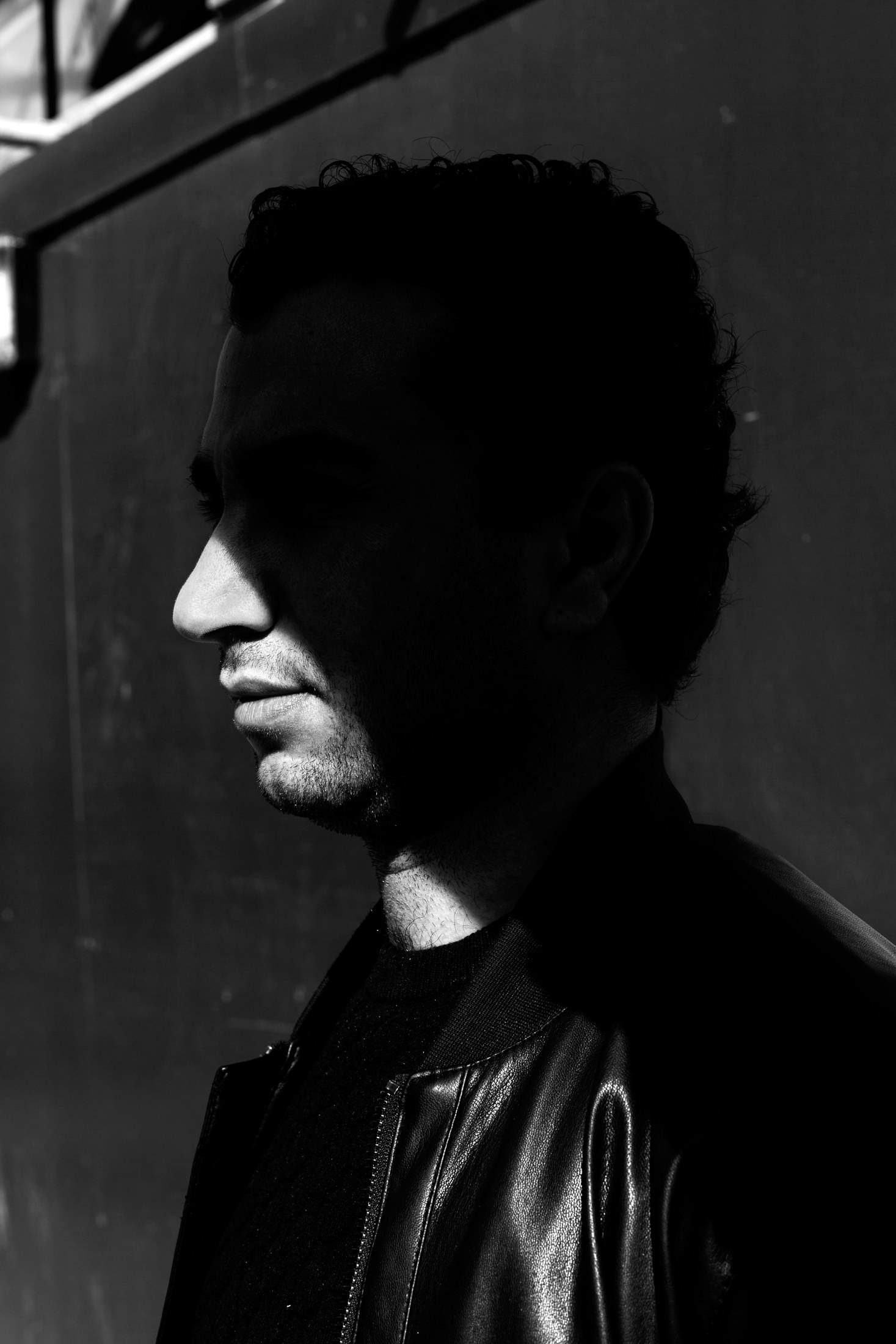
Migrant Voice says many of countries are linked to serious allegations of abuse and violence against migrants. In its report, one Syrian man describes being severely beaten by authorities in a camp in Bulgaria and witnessing a man being beaten so barbarically his skull was fractured.
On Monday, Ramadan is travelling to Brussels to lobby the European Commission to abandon the Dublin Regulation altogether. An updated policy – called Dublin IV – is in the early stages of being renegotiated, but experts fear it will be more draconian than earlier versions.
A Europe-wide exemption on returning asylum-seekers to Greece was also lifted this week, which could result in thousands of refugees being sent there from northern Europe, though Britain says it has no immediate plans to return anyone there.

Younis is sitting nervously in a small central London meeting room, chosen as a neutral meeting place because he is so afraid of being found. “Every time I see a police car I’m scared they’re coming for me,” he says. “It makes me afraid to go outside.”
He has a lot to lose if he is sent away from Britain. “My six brothers and sister are here. My mother is here.
“What would I do in Hungary? They didn’t even give me my medication there. I can’t live there because of the way I was treated. I nearly died there, going four days without medication.”
It is almost five years since he left Syria to find a safe place to bring his wife to. But while he is undocumented, she is stuck in the Syrian city of Daraa and losing hope.
“She’s waiting for me. There’s nothing I can do. I say as soon as I get documents I can bring her but there’s nothing I can do now. On WhatsApp my wife tells me how difficult things are there. She asks me, ‘What’s the end of this? Are you going to bring me or are you coming back to me?’ But we just have to wait now.
“There’s still a lot of fighting in her area. She’s so scared and she doesn’t believe me any more. She says everyone went out and took their family. But I can’t bring her while I have no papers.”
It is not just his marriage that has been left in limbo. Living in hiding means every other aspect of his life is on hold too. “My life is very difficult – you’re hiding from everyone, staying at home,” he says. “My friends say ‘come and play football with us’, but I’m scared.”

He adds: “I don’t go to college. My brothers and my mum provide for me. I don’t go out. I’m living with difficulty – I can’t work because I’m not allowed. I’m worried they’ll catch me. I’d like to be a painter-decorator and live a normal life like other people.”
Younis says he shares a two-bedroom flat in a rundown part of the capital with six men. He used to live with family but now he is afraid he will be caught there. “I know a lot of people in the same situation,” he says. “About five or six that I know of who don’t go to sign with the Home Office because they are afraid.”
He goes regularly to the GP for his pills, which are essential to his survival. The GP has not asked about his immigration status and is registered to a family address he no longer lives at. But Younis knows these visits could be his undoing. “If I get in trouble I know it will be because of the GP, but what can I do? If I stop having this medication for three days, on the fourth day I could die.”
When Younis first arrived in the UK in Dover in December 2013 he gave himself up to the immigration authorities. He spent a month in detention there before his brother came and got him released. For three months in 2014 he was reunited with his family and living with them in northwest London. He went regularly to London Bridge to sign with the Home Office while it considered his case, and hoped it was a new beginning.
Then one day he went to sign and he was taken into detention again. The Home Office had found the records of his fingerprints in Hungary and was preparing to send him there. While in detention he was booked on to a flight to Hungary, but at the eleventh hour a solicitor got his flight cancelled and he was released on bail.
Again it was his brother who acted as his surety. The Home Office told his brother that if Younis stopped living with him, or stopped going to his regular signing appointments, he was obliged to inform the department.
Younis had no intention of signing any more. “I told my brother I’m not going to sign again because they will just try and send me away again. My brother told the police I’d left because that was the agreement. I was upset but I understand he had to do that. Our relationship is not like before now.”

Younis’s account of his journey across Europe – and the way he was treated by police and immigration officials – helps explain why he and so many others are reluctant to return to the countries they first arrived in.
After fleeing to Lebanon by car and on to Turkey by plane, Younis paid smugglers to take him to Greece on a night-time sea crossing. He was one of 15 people – including a mother and toddler – crammed into a 2-metre-long rubber dinghy. It was summer but the waves were still enormous. When they arrived in mainland Greece at 3am they were detained immediately.
Younis says he was held in detention in Greece for three months before he found a lawyer who helped him to get out. The conditions, he says, were appalling. “They didn’t touch me but they beat another Syrian guy,” he says. “He was about 18 or 19 and they came and beat him very hard with sticks. The young man had heard some bad news about what happened to his family in Syria and he tried to create something to hang himself with. The guards heard about it and started to beat him.”
He stayed in Greece for more than a year, trying to find smugglers who could get him out of the country. Eventually he took a bus with 16 others to the border with Macedonia. They walked for three days, and paid smugglers €1,500 each to take them to Serbia through the mountains.
His poor health meant he struggled to keep up with the group, and eventually one evening he lost them altogether. His phone was out of battery, it was cold in the mountains, and he thought that was it: “If someone falls, nobody will wait for you. I was very scared and walked all night.”
After 14 hours of walking he met another smuggler who helped him walk to Serbia with a group of others. After 10 days they reached the Serbian border and were promptly arrested by Serbian police. “They made us stand in a line and started beating us with batons, one by one. We called them electric sticks, because when you’re beaten with them it feels like you’re being electrocuted. They beat each person for one or two minutes. I was hit across the ear. Every time they arrested groups they found at the border they beat them so hard. If the Serbian police catch someone they break them.
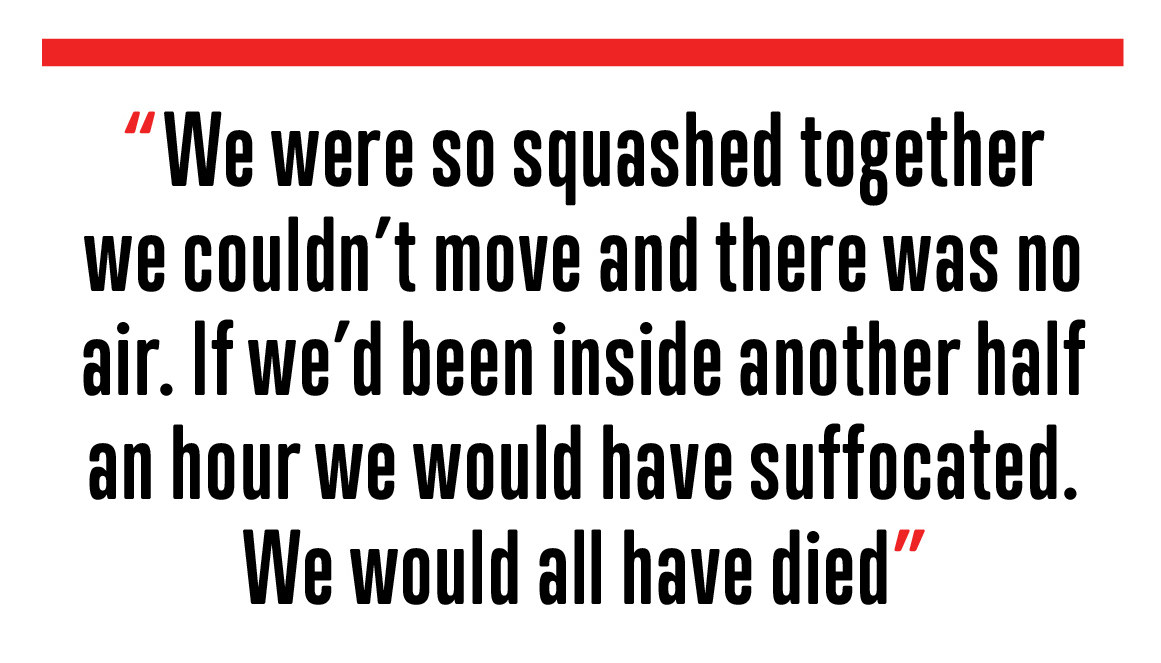
“After six hours in detention we were taken close to the border with Macedonia in an army vehicle, then they marched us to the border with sticks and water hoses like sheep. We waited four or five hours until the police and then went back into Serbia.”
They found another smuggler and paid him €1,200 each to be taken to Hungary. “The smuggler said, ‘Once you reach Hungary nobody will stop you or ask anything, you’ll be under the protection of the EU.’”
But it didn’t work out like that.
“In Hungary, the suffering started,” Younis says. After six days walking, they were arrested at the Hungarian border. “They took us, handcuffed us, blindfolded us in the back of a closed van. There were around 20 people. They drove for about four hours from the border with Serbia. We were so squashed together we couldn’t move and there was no air. If we’d been inside another half an hour we would have suffocated. We would all have died.
“At the prison there were about 40 or 50 people in a room about this size,” he says, gesturing around the small meeting room the interview is happening in, which is big enough for just a table and a handful of chairs. “It was very hard to sit down – there were just too many people. We were in that space for 24 hours. There was no food or drink other than a small piece of bread.”
Next they were moved to another prison, and Younis really started to struggle. He had run out of his daily medicine, which he needs to prevent organ failure. “I told them I needed the drugs but they said ‘later’.”
His troubles did not stop there. “Some of the other prisoners tried to rape me,” he says. “They looked European. With sign language to signal money, they asked if we’d go and have sex. I was in that prison for 10 days – it was really hard.”
At this point he had gone almost four days without the tablets he carries with him everywhere. “I was in so much pain. I didn’t know what I was doing any more. I said, ‘Why am I here? Let me have my medication,’ and they said no. I said, ‘You can send me back to Syria but give me my medication.' They said, ‘You have to apply for asylum,’ and I said, ‘I’ll do it, just give me my medication.' They said, ‘We won’t give you your medication unless you give us your fingerprints.' So I did. My life is more important and I didn’t know what it was for or what it meant. They said, ‘It’s just because you came in and you want to leave.' They didn’t say it might affect you later on.”
After this he was free to leave. He walked to Budapest and took a train to Austria, but was again arrested at the border. After eight days in a camp in Austria he went on to Italy by train and spent two days sleeping outside Milan station. From there he took a train to Paris and on to Calais.
It took a month of sleeping in a tent in Calais and surviving off charity food before he managed to make it to Britain. “Every night I went out to try and get to Britain on a lorry. I tried more than 20 times, and every night the French police stopped us and sent us back.”
Eventually he succeeded by sneaking into a cargo train going through the Channel tunnel. “I kept hiding and walking close to the rail and then when we saw the train we ran. We managed to jump on and open the door and hide inside.”
Younis is not sure how much longer he can live in the shadows, but he feels that going back to Hungary is not an option. “If nothing changes I’ll go back to Syria,” he says. “At least there I can be with my wife.”

Rob McNeil, a researcher at Oxford University’s Migration Observatory, says it is very difficult to get a sense of how many migrants are living under the radar like Younis. “Any number you see on this is made up,” McNeil says. “You can dress these numbers up in authoritative clothes but they’re just shots in the dark based on a complete lack of real evidence.”
The figures typically quoted in tabloid articles are estimates based on analysis using the 2001 census. Because migrants in hiding are not captured in official data the latest estimate using the 16-year-old census came up with a very wide likely range of between 417,000 to 863,000 people – but even this is debated by experts.
Though figures are hard to pin down, the anecdotal evidence from within the Syrian expatriate community is that this is a growing problem.
Mohammed, 26, lives in Manchester to be near his brother and sister, who both live there along with his nieces and cousins. He has been in Britain since September 2016, and just over a month ago he stopped signing with the Home Office because he believes he will be sent to Germany.
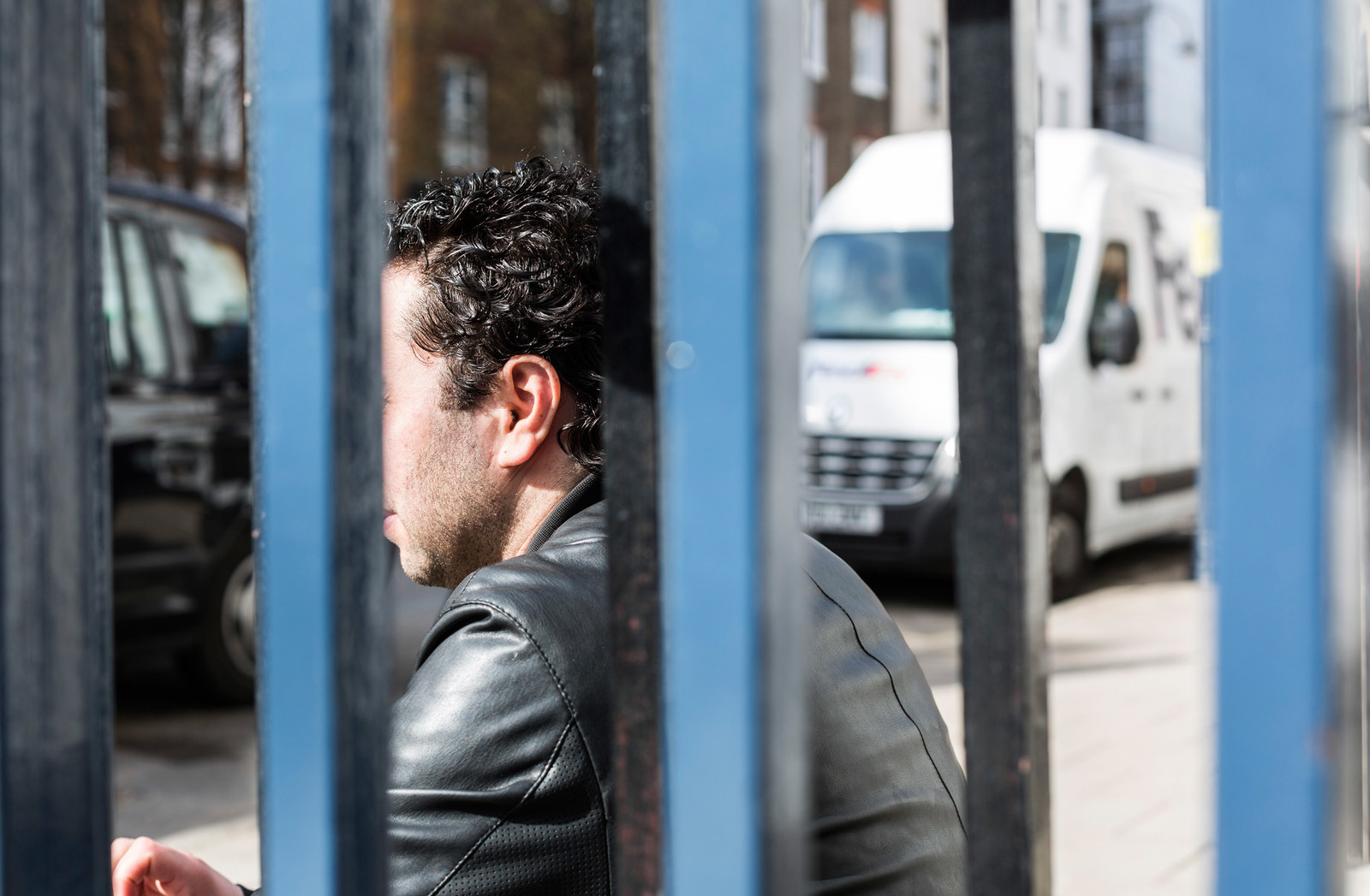
“When I entered Germany the police took me to a detention camp and fingerprinted us," he says. "They said it was normal, and when we said we wanted to go to England they said 'don't worry'. When I got that letter I can hardly describe how I felt. It was very bad. All day and all night I think about that letter. It said, ‘You have fingerprinted in Germany and Greece.'”
Early last month he was about to go to sign and got a call from a friend who he travelled to the UK with to say they had been detained at the Home Office’s signing centre because the friend had fingerprinted in Germany. “Then it felt more dangerous,” Mohammed says.
Mohammed graduated from university in Daraa in 2014, where he was studying English literature, before starting the long journey to the UK. He likes James Joyce and Shakespeare and is desperate to continue his studies and become a teacher. As long as he lives underground that will never be an option.
He can’t work officially, but he does odd jobs for friends to get cash. Friends have taken pity on him and he is living with them rent-free. “Life here is very difficult if you don’t have money or papers," he says. "We’re called 'illegal' and that’s how it feels. I know other people like me. Some of my friends fingerprinted in Italy and they’re in the same situation.
“It is a big problem for us. We came to find safety and be legal and suddenly we find ourselves with nothing. Every day I’m scared the police will send me to Germany. One day they will take me. Whenever I see the police I cross to another road.”

The most recent Dublin Regulation was signed in 2008, and a fingerprint database was set up with the aim of preventing applicants from submitting applications in multiple member states.
The civil war in Syria has caused huge pressure on this agreement, which benefits wealthy northern European countries while passing on the problem to the more stretched economies in southern Europe, whose coastlines make them an easy arrival point from the Middle East.
Karl Pike, policy and advocacy manager for refugees and asylum at the British Red Cross, previously told BuzzFeed News that the regulations were “failing families and young children across Europe”. He added: “The priority for the UK and Europe should be ensuring countries of first arrival are supported, with increasing numbers of refugees and asylum-seekers transferred from those countries, not increasing numbers transferred back to them.”
In its latest report, Migrant Voice argues the regulations do not properly take into account each applicant’s individual circumstances, or their family connections in another country. The charity argues this results in a Europe-wide policy of “detention and deportation of people to states in which they are not welcome, and where they are often abused, often seriously and sometimes allegedly with state sanction”.
It also says it results in an “unnecessarily confusing and arduous process for asylum seekers who are already often traumatised and fleeing desperate conditions – which can exacerbate mental and physical health problems”.
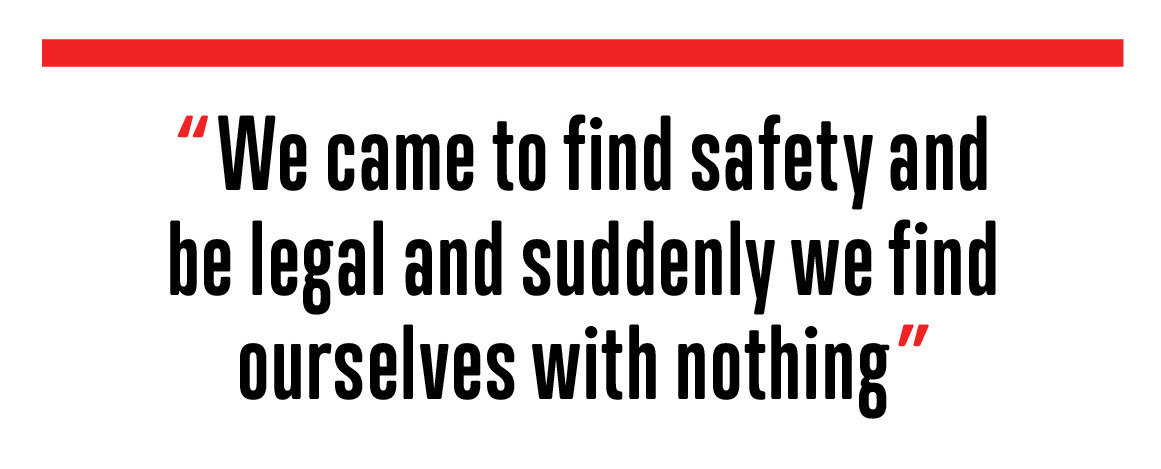
A Home Office spokesperson said: “We have no current plans to resume Dublin returns to Greece and are currently not returning asylum seekers to Hungary under the Dublin Regulation.
“In April 2016, the High Court ruled that transfer to Bulgaria under the Dublin Regulation would not breach the European Convention on Human Rights.
“If there is evidence that Bulgaria is responsible for an asylum application, we will seek to transfer the application.”
Migrant Voice says people it has worked with were left so desperate they “were driven to self-harm, such as burning their thumbs and fingers in a desperate attempt to change their fingerprints and thus avoid being sent away from their family and community".
Muhammed, a 29-year-old Syrian living in Birmingham, has gone into hiding because he does not want to be sent back to Italy. He was in Italy for just three days, as part of a long journey to Britain, but because he says he was forced to give fingerprints both there and in Greece, Britain has been trying to remove him.
“In Italy I saw police officers with sticks and guns and I was scared that if I didn’t fingerprint they would kill me,” he says.
Muhammed says he has been in the UK for nearly four years, including two stays in immigration detention while he fought his asylum case. He stopped signing with the Home Office a month ago because he is afraid of being sent to Italy.
He would like any job now – even on the black market – but says it is impossible to find anything. “Nobody trusts you if you’re here illegally,” he says. “It’s no life like this. I’m not looking forward to life but I can’t go back.”
He spends his days in the library reading, not wanting to fritter away his time, but he knows that without papers his prospect of a decent life in the UK is slight.
“I was a teacher in Syria, and studying a master's in demographic research," he says. "I’m looking for a new future. When I left my country I saw people die in front of my eyes and I remember bad images in my mind.
“I chose Britain because before I thought it was somewhere that respected human rights. But since I’ve been here I haven’t seen that.”
